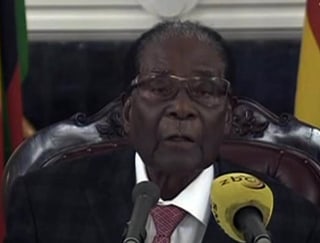
Zimbabwe’s ruling party will discuss the impeachment of President Robert Mugabe Monday after the 93-year-old despot ignored a deadline to end his nearly four decades in power following last week’s military coup.
Impeachment could see the world’s oldest ruler kicked out by a vote in parliament and would represent an ignominious end to the career of the “Grand Old Man” of African politics, who was once lauded across the continent as an anti-colonial hero.
ZANU-PF chief whip Lovemore Matuke told Reuters the party’s members of parliament would meet Monday to start mapping out the president’s removal. He had already been removed as party leader.
Mugabe stunned Zimbabweans in a rambling late night Sunday television address by avoiding any mention of resignation.
There was even speculation that he read the wrong speech in his live television address, or skipped over passages about standing down.
Anxious Zimbabweans have been trying to decipher a barely audible aside comment he made to military chief Constantino Chiwenga at the end of the address. In the audio, which is not clear, Mugabe refers to a “long speech” or a “wrong speech”.
Moments after the speech, war veterans leader Chris Mutsvangwa told Reuters they would lead public protests in the streets of Harare, cranking up the pressure on Zimbabwe’s ruler of the last 37 years.
ZANU-PF’s central committee on Sunday named Emmerson Mnangagwa as its new leader. It was Mugabe’s sacking of Mnangagwa as his vice-president — paving the way for his wife Grace to succeed him — that triggered the army to seize control on Wednesday.
Related: Mugabe makes post-coup appearance — but where’s ‘Gucci Grace’?
The once-formidable Mugabe is now a virtually powerless figure. He is largely confined to his private home by the military.
On Saturday, hundreds of thousands took to the streets of the capital Harare to celebrate Mugabe’s expected downfall and hail a new era for their country.
The huge crowds in Harare have given a quasi-democratic veneer to the army’s intervention, backing its assertion that it was merely effecting a constitutional transfer of power, rather than a plain coup, which would risk a diplomatic backlash.
The military appears to favor a voluntary resignation to maintain a veneer of legality in the political transition. Mugabe, in turn, is likely using whatever leverage he has left to try to preserve his legacy or even protect himself and his family from possible prosecution.
Related: Why reversal of elephant trophy ban comes at an odd time
But some of Mugabe’s opponents are uneasy about the prominent role played by the military, and fear Zimbabwe might be swapping one army-backed autocrat for another, rather than allowing the people to choose their next leader.
Armored vehicles manned by soldiers were still stationed on some street corners in the capital on Monday.
source:-.nbcnews



